|
|
|
Sort Order |
|
|
|
Items / Page
|
|
|
|
|
|
|
| Srl | Item |
| 1 |
ID:
110654
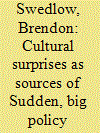

|
|
|
|
|
| Publication |
2011.
|
| Summary/Abstract |
A major complaint against cultural theories is that they cannot explain political change (Lockhart 1997). Cultural and institutional accounts of politics are also often seen as antagonistic (Chai 1997; Grendstad and Selle 1995; Lockhart 1999). The cultural theory (CT) developed by Mary Douglas, Aaron Wildavsky, and others (see, e.g., Schwarz and Thompson 1990; Thompson, Ellis, and Wildavsky 1990), by contrast, offers a theory of culture that includes a theory of cultural change that integrates institutions into its explanation of change (Lockhart 1997, 1999; Thompson, Ellis, and Wildavsky 1990, 69-81; Wildavsky 1985). Moreover, CT can help specify the cultural conditions for sudden, big institutional and policy change, thereby, I argue, strengthening Frank Baumgartner and Bryan Jones's "punctuated equilibria" (PE) theory of change (Baumgartner and Jones 1993, 2002). The plausibility of this CT of PE change is illustrated in this article by using it to explain dramatic changes in forest and wildlife management in the Pacific Northwest (PNW) (building on Swedlow 2002a, b, 2003, 2007, 2009, and 2011a, b).
|
|
|
|
|
|
|
|
|
|
|
|
|
|
|
|
| 2 |
ID:
184746
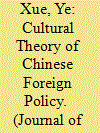

|
|
|
|
|
| Summary/Abstract |
This article introduces a cultural theory of Chinese foreign policy based on Chinese face culture and its three-dimensional features, namely: motivation; cognition and behavior. The core promise of this theory contends that face is the cultural expression of self-esteem, which is a powerful motive that drives China’s foreign policy. With the Chinese relationalism acting as a cognitive filter, there is a distinctive approach to fulfill this desire. This article shows, first, the origin of Chinese face culture and its current usage in Chinese society. Second, it explores how each dimension of face peer finds its relevance in China’s foreign policy. Third, it examines how to operationalize face in foreign policy analysis. Finally, the theoretical and practical importance of this theory will be summarized.
|
|
|
|
|
|
|
|
|
|
|
|
|
|
|
|
| 3 |
ID:
100492
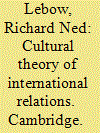

|
|
|
|
|
| Publication |
Cambridge, Cambridge University Press, 2008.
|
| Description |
xi, 762p.
|
| Standard Number |
9780521691888
|
|
|
|
|
|
|
|
|
|
|
|
Copies: C:1/I:0,R:0,Q:0
Circulation
| Accession# | Call# | Current Location | Status | Policy | Location |
| 055507 | 327.101/LEB 055507 | Main | On Shelf | General | |
|
|
|
|
| 4 |
ID:
056779
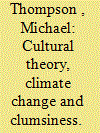

|
|
|
| 5 |
ID:
110656
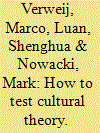

|
|
|
|
|
| Publication |
2011.
|
| Summary/Abstract |
This symposium highlighted the relevance of the cultural theory (CT) pioneered by anthropologists Mary Douglas, Steve Rayner, and Michael Thompson and political scientists Aaron Wildavsky and Richard Ellis for explaining political phenomena. In this concluding article, we suggest ways in which CT can be further tested and developed. First, we describe how the theory has been applied thus far and some of the achievements of these applications. Then, we examine some of the challenges revealed by this research. Finally, we discuss ways of applying CT that promise to help meet these challenges. These methods include nesting case studies and combining case study and survey research, simulations, experiments, and approaches from social neuroscience.
|
|
|
|
|
|
|
|
|
|
|
|
|
|
|
|
| 6 |
ID:
143314
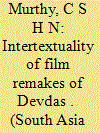

|
|
|
|
|
| Summary/Abstract |
The screen adaptation of the novella Devdas by Saratchandra Chattopadhyay is an important landmark in early Indian cinema. A prominent film, screened in four Indian languages (Bengali, Hindi, Telugu and Tamil), it seems to offer a novel vision of romantic love and romanticism. This article critiques the fanciful interpretations of the film provided by some postmodern academics in the field of comparative literature. It endeavours to place the film both as text and cinematic work into a broader perspective based on the study of intertextuality of three renditions: Raghavaiah’s Devdas (Telugu, 1953), Bimal Roy’s Devdas (Hindi, 1955) and Bhansali’s Devdas (Hindi, 2002). Grounded in cultural theory and Indian performative aesthetics coupled with moving image analysis, this study highlights the underlying, deep-rooted romanticism embedded in Indian philosophical and aesthetic traditions of devotion between atma (individual soul) and paramatma (absolute soul), personifying Paro/Chandramukhi as atma and Devdas as paramatma. This article, part of a larger project on de-Westernising media studies, makes a critical intervention in current South Asian Studies by aiming to provide a novel theoretical framework to which the philosophical and traditional tenets grounding the novella of Devdas can be anchored.
|
|
|
|
|
|
|
|
|
|
|
|
|
|
|
|
| 7 |
ID:
110651
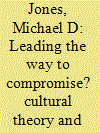

|
|
|
|
|
| Publication |
2011.
|
| Summary/Abstract |
Climate change is easily one of the most contentious policy problems facing the United States. A majority of climate scientists agree that the earth has warmed over the last 100 years and that human-made greenhouse gasses are the cause (e.g., Doran and Zimmerman 2009; IPCC 2007; Oreskes 2004, but also see Bray 2010), yet a nontrivial portion of the US population diverges sharply from this dominant scientific position (see, for example, Jenkins-Smith, Herron, and Silva 2010, 41-45; Leiserowitz 2006; Nisbet and Myers 2007). Why? Past research usually points to the public's lack of climate change knowledge (e.g., Kellstedt, Zahran, and Vedlitz 2008), finds that media over report the views of climate change skeptics in a misplaced quest for "balanced" reporting (e.g., Boykoff and Boykoff 2007, but see Swedlow and Wildavsky 1995), or the public simply take cues from opinion leaders whom they trust (e.g., Malka, Krosnick, and Langer 2009). This article moves beyond the predominant concern with climate change knowledge, messaging structures, and cue taking in past research, and shifts the focus to characteristics intrinsic to the individual. The research presented here assesses the extent that the cultural theory (CT) developed by Mary Douglas, Aaron Wildavsky, and others (see, e.g., Schwarz and Thompson 1990; Thompson, Ellis, and Wildavsky 1990) can help political scientists understand why so many Americans do not align themselves with the majority of scientists and can help policy makers broker compromises on climate change policy.
|
|
|
|
|
|
|
|
|
|
|
|
|
|
|
|
| 8 |
ID:
098617
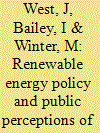

|
|
|
|
|
| Publication |
2010.
|
| Summary/Abstract |
Public opposition to the siting of renewable energy (RE) facilities and public reluctance to invest in RE remain key obstacles to the expansion of the renewables sector in the UK and a number of other European countries. Although there is a growing body of qualitative research on factors that inform public attitudes towards RE, the majority of studies have tended to be quantitative and to view 'the public' and 'public opinion' as homogeneous wholes. This study uses a cultural theory framework and focus groups conducted in the South West UK to develop deeper understandings of how individuals' worldviews can inform opinions and behaviour in relation to RE. These findings are used to explore ways in which government policies on RE might be tailored to engender greater public support and participation. Issues discussed include the provision of economic incentives, information on climate change and RE, linking renewables to overall energy behaviour, and landscape aesthetics.
|
|
|
|
|
|
|
|
|
|
|
|
|
|
|
|
| 9 |
ID:
135248
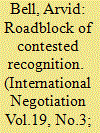

|
|
|
|
|
| Summary/Abstract |
Resistance to negotiation and the continuation of violence dictate the course of events in the Afghanistan conflict. However, several studies have thoroughly explored the interests of the main parties to the conflict and a settlement that respects their key demands is possible. The current military situation resembles a “hurting stalemate,” which according to rationalist assumptions should compel the parties to move toward negotiations. This article argues that the main obstacle to negotiation is an underlying and unaddressed conflict of recognition between the United States, the Afghan government, and the Taliban. While each party believes it is driven by justice claims, they perceive their opponents to be driven by a hostile strategy informed by incompatible interests. Relying on the Cultural Theory of International Relations, this article explores the parties’ motives in the conflict, focusing on the need to strive for esteem and honor. It suggests that the reciprocal acknowledgement of legitimate identity-related justice claims could remove a key obstacle to formal negotiation.
|
|
|
|
|
|
|
|
|
|
|
|
|
|
|
|
| 10 |
ID:
132919
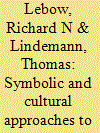

|
|
|
|
|
| Publication |
2014.
|
| Summary/Abstract |
This forum offers a symbolic and cultural approach for understanding the outbreak of World War I that stresses the interactional and symbolic-cultural aspects of German decision makers' brinkmanship during the July crisis of 1914. Contrary to excessive structuralist accounts, the contributions focus on what actors 'do' and 'feel' during a crisis. In the German-Austrian case, symbolic interactions during the July crisis were strongly marked by challenges to the 'face' of decision makers. The second theme of the Forum is to question the purely 'material' nature of those structures traditionally referred to as permissive for World War I. Structures, in fact, are symbolic, too. Like theories on status discrepancy, the Forum stresses the impact of 'responsibility gaps'. However, the contributors also point to the emotional aspects and internal legitimacy problems caused precisely by those status lags.
|
|
|
|
|
|
|
|
|
|
|
|
|
|
|
|
| 11 |
ID:
150035
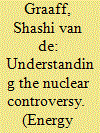

|
|
|
|
|
| Summary/Abstract |
The need for a secure and sustainable energy future has become firmly entrenched on the global political agenda. Governments worldwide are seeking solutions that will ensure security of their energy supplies, while reducing carbon emissions in the fight against climate change. Advocates of nuclear power have reframed the technology as the most reliable, cost-effective and immediate solution to both of these policy problems, and predicted the emergence of a 'nuclear renaissance’. However, there is little evidence to date that suggests a nuclear renaissance has actually taken place. Public opinion polling demonstrates that many remain unconvinced of the need for nuclear power. This paper uses Cultural Theory as a heuristic to understand why the arguments for a nuclear renaissance have been largely unsuccessful. It argues that the failure of nuclear advocates to engage with a wider cross-section of world-views has prevented the controversy surrounding nuclear power from being resolved, and the nuclear renaissance from becoming a reality. In doing so, this paper builds upon a growing recognition of the contribution that social science research can make to understanding public acceptance of energy policy choices.
|
|
|
|
|
|
|
|
|
|
|
|
|
|
|
|
|
|
|
|
|